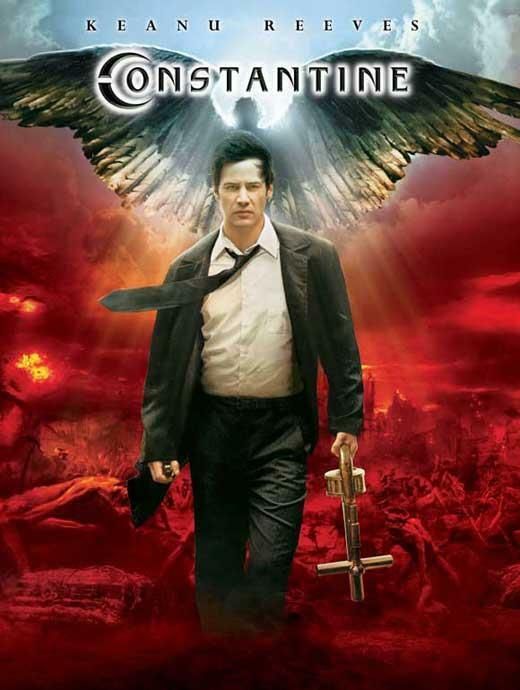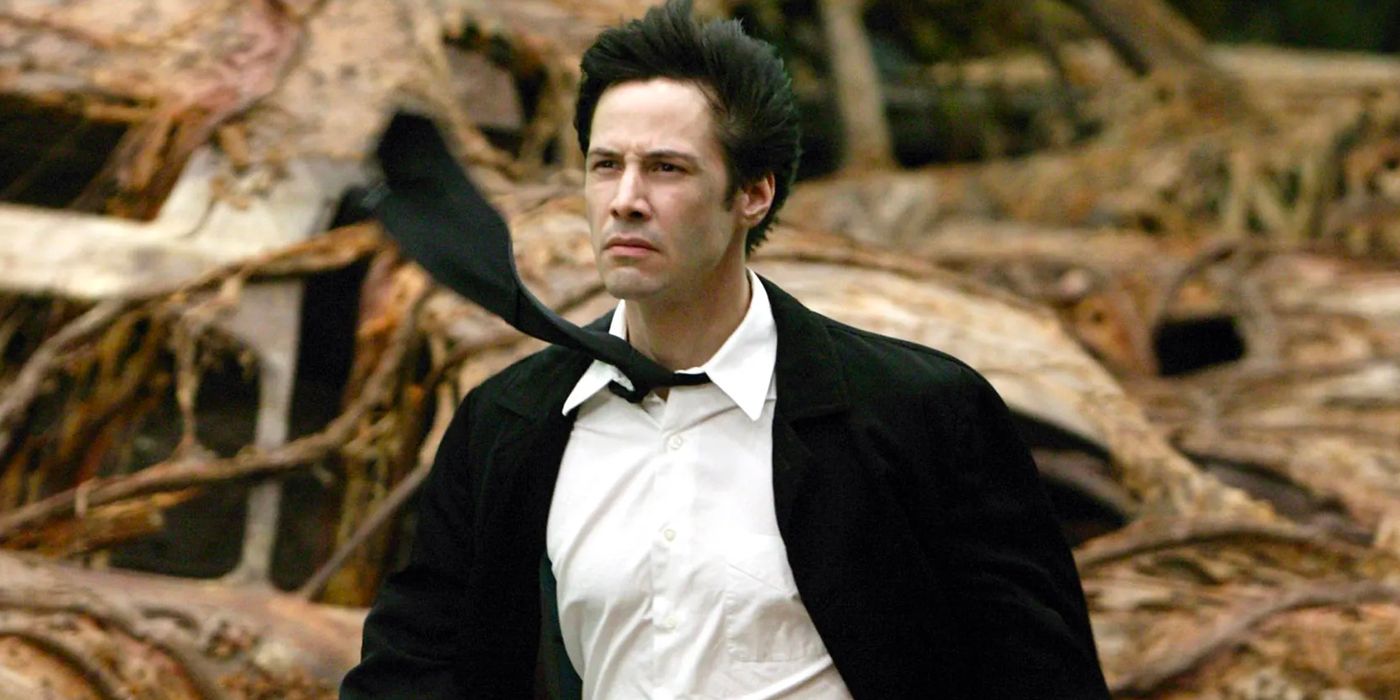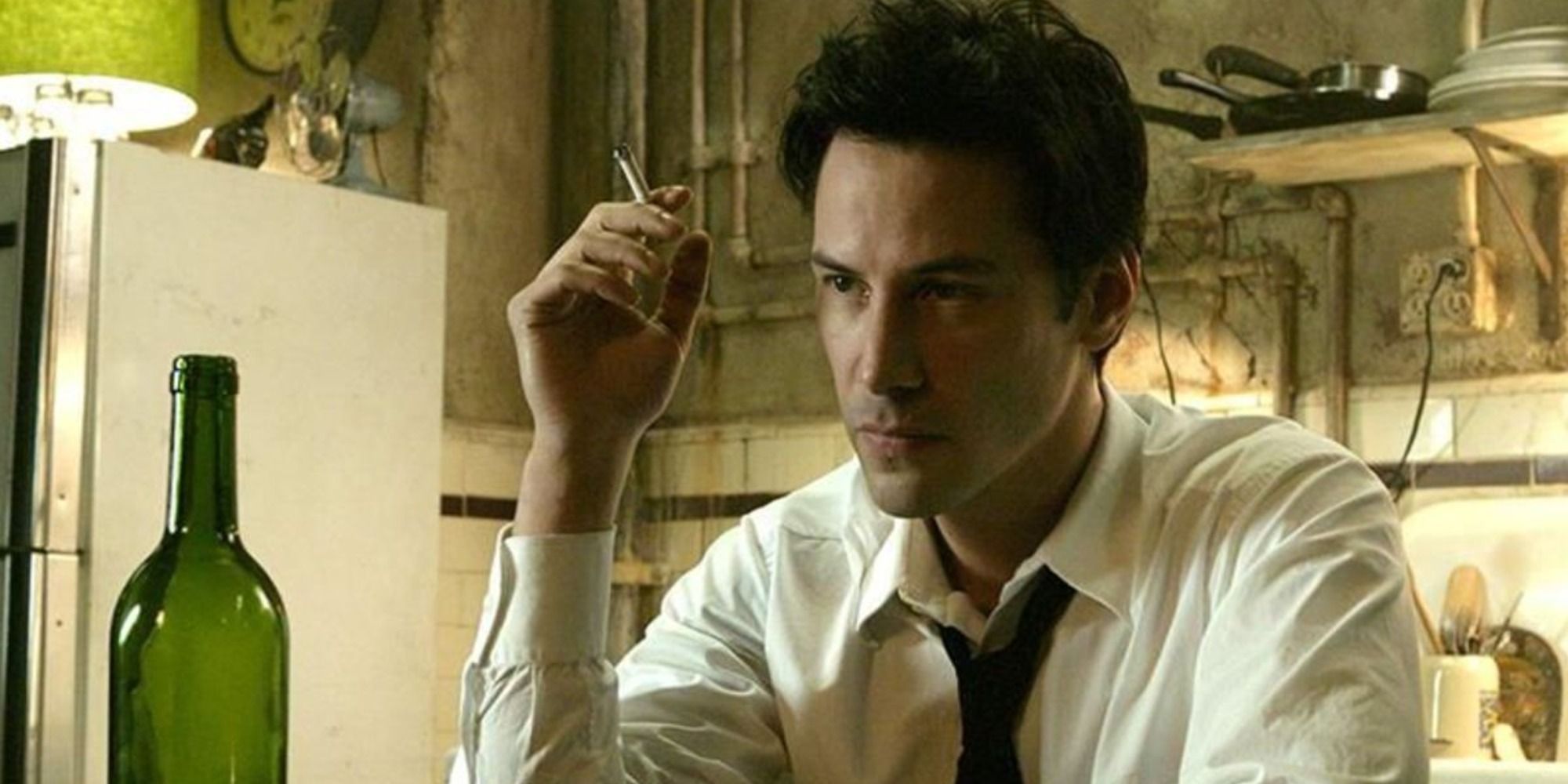The Big Picture
- Roger Ebert criticized Constantine for lacking uniqueness and engaging elements.
- The film portrays demonologist Constantine fighting to stop the rise of the antichrist, it stars Keanu Reeves, Rachel Weisz, and Tilda Swinton.
- Despite Ebert's review, Constantine has gained popularity and may see a sequel soon.
If there was something in a film that the late Roger Ebert didn't like, or outright hated, he had no qualms about being deliberate and vocal about it. One such film that earned Ebert's scorn is Constantine: the film where Keanu Reeves takes on the role of the occult detective John Constantine, who first appeared in DC Comics in the pages of Swamp Thing #37 in 1985. There's no question that the film is divisive, as evidenced by the extreme love-or-hate critical reviews that have Constantine sitting at 46% on review aggregate site Rotten Tomatoes, but just what did Ebert have against it?

Constantine
Supernatural exorcist and demonologist John Constantine helps a policewoman prove her sister's death was not a suicide, but something more.
- Release Date
- February 8, 2005
- Director
- Francis Lawrence
- Cast
- Keanu Reeves , Rachel Weisz , Shia LaBeouf , Djimon Hounsou , Max Baker , Pruitt Taylor Vince
- Runtime
- 122
- Writers
- Jamie Delano , Garth Ennis , Kevin Brodbin , Frank A. Cappello
What Is the 2005 Movie 'Constantine' About?
Constantine begins as the cynical titular character exorcises a demon from a young girl in Los Angeles, having seen the demon's attempt to come to Earth through her. Wait, what? Yes - Constantine can see the hosts of Heaven and Hell, a gift that drove him kill himself as a teenager, and although he was revived, the attempt has sealed his fate, and Constantine is destined to go to Hell when he dies (which may be soon, given his penchant for smoking has led to terminal lung cancer). Constantine knows that a treaty between Heaven and Hell should have made the demon's attempt impossible, and meets with the half-breed angel Gabriel (Tilda Swinton) and asks for an extension to his life, allowing him to continue his work in deporting the forces of Hell.
His request granted, Constantine is tracked down by detective Angela Dodson (Rachel Weisz), who seeks his help in investigating the mysterious suicide of her sister Isabel, a devout Catholic. At first reluctant, Constantine changes his mind after seeing demons pursuing the detective. After fighting them off, Constantine takes a peek into Hell via ritual and confirms that yes, Isabel did kill herself, only there's more to the story. Father Hennessy (Pruitt Taylor Vince), a friend of Constantine's, finds a symbol on Isabel's wrist while examining her body at the morgue, a symbol that represents the antichrist Mammon, as explained by another ally, Beeman (Max Baker). Mammon is Lucifer's (Peter Stormare) son, prophesied to usurp his father and conquer the Earth, aided by a psychic and divine sources. And who is a powerful psychic, or at least was? Isabel. And she killed herself to stop Mammon.
'Constantine' Saves the World
The information comes at a great cost, with both Hennessy and Beeman slain by half-breed demon Balthazar (Gavin Rossdale). On the plus side, Dodson shares the same psychic abilities as her sister, abilities which are rekindled through a near-death experience. Constantine, aided by Dodson's powers, finds Balthazar and interrogates him, discovering that the "divine source" of the prophecy is the blood of Christ on the tip of the spear that pierced Jesus on the cross. Good news: the spear tip is in the possession of Gabriel. Bad news: Gabriel is ticked that God favors humanity and forgives even the most sinful, so he plans to unleash Hell on Earth so only the truly deserving of God's love are left. Worse news: Dodson is the conduit for Mammon's rebirth.
Gabriel has taken Dodson, now possessed by Mammon, to the psychiatric hospital where Isabel was when she died. Constantine and his apprentice Chas (Shia LaBeouf) battle their way through a legion of demons to get to Dodson. Once there, they are seemingly successful in exorcising Mammon from her, but alas, no. Gabriel kills Chas, tosses Constantine away, and prepares to pierce Dodson with the spear tip, making Mammon's estimated time of arrival within seconds.
Unable to stop Gabriel alone, Constantine kills himself by slitting his wrists, banking on Lucifer himself coming to collect his soul. Sure enough, Lucifer does show up, pausing time to stop while the fallen angel collects his prize. But the crafty Constantine convinces Lucifer to step in and stop Mammon himself, keeping his place as King of the Demons secure. Despite Gabriel's attempts to stop him, Lucifer burns Gabriel's wings, rendering the angel mortal, and banishes Mammon back to Hell.
With that settled, Lucifer offers Constantine his life back, but Constantine declines the offer and asks that Isabel be sent to Heaven. Isabel is released, but thanks to his selfless act, Constantine too is movin' on up. Scratch that: Lucifer cancels Constantine's trip to heaven by restoring him to life — ripping out the cancer from his lungs — convinced that Constantine will end up in Hell by his own actions. Now back, Constantine entrusts Dodson with the spear tip and walks away. In a post-credits scene, Constantine sees Chas has become an angel after visiting his grave.

‘Halloween Ends’… Or Does It? 10 Other Franchises That Came Back from the Dead
Even the ones we wish would just stay dead.Roger Ebert Picks Apart 'Constantine'
To be fair, Roger Ebert's one-and-a-half star review of Constantine isn't so much a scathing take-down of the film, but rather an indictment on the lack of anything that makes it unique. With the wry wit he was famed for, Ebert uses his review to pick apart its elements. From the start, Ebert makes it clear that the film didn't captivate him, making a "Six Degrees of Kevin Bacon" case that confirms Constantine isn't about the Roman emperor, Roman emperor to a documentary about emperor penguins, emperor penguins to a trivial fact about emperor penguin males sitting on eggs all winter. Ebert likens the film's depiction of Hell as a "post-nuclear Los Angeles created by animators with a hangover" (one has to admit, the man could paint a picture).
From there, Ebert points out the absurdities of the film as he sees them. How does one guy in one city, tracking down half-demons and casting them back on a case-by-case basis, make a difference in what is, in theory, a global threat? Why does he have the spiritual warfare equivalent of James Bond's Q? Why is it only Catholics that take on Satan and his minions in the movies and not Presbyterians or Episcopalians? Ebert sees Keanu Reeves' performance as being deliberately morose and low-energy, which speaks to the film as a whole.
Constantine may not have been one of Ebert's favorites, but it did something right, a film that has grown in popularity and acclaim over time. A Constantine 15th Anniversary Reunion hosted by Collider in 2020, attended by Keanu Reeves, director Francis Lawrence and producer Akiva Goldsman, played into the film's new-found acclaim and revealed some great behind-the-scenes stories from those involved. A long-gestating sequel had a positive update as recently as October 2023 and DC has kept the character alive in the public eye, first as a series on NBC in 2014-2015, starring Matt Ryan as the titular anti-hero, who then jumped ship to become a regular on the CW's DC's Legends of Tomorrow after NBC cancelled the series, and in its animated films, like Justice League Dark. While there's been silence on projects containing the character currently, John Constantine may very well escape from development Hell soon. Roger Ebert be damned.
Constantine is available to stream in the U.S. on Max


